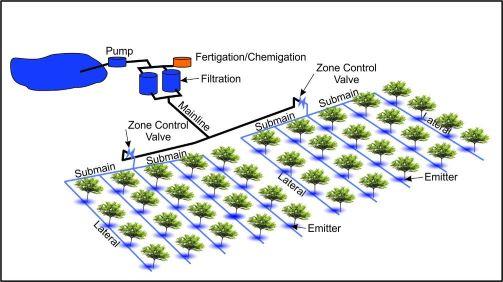Core Components of a Typical Agricultural Micro Irrigation System
1. Water Supply
The water source can be:
- Open sources such as rivers, channels, dams, or tanks
- Groundwater sources such as bores or wells
2. Pump
The pump supplies energy to operate the system. When selecting a pump, consider:
- Operating pressure of micro emitters
- Friction losses in the pipes
- Elevation changes
- Losses from valves, fittings, and filters
- Allowances for system inefficiencies and ageing
A well-chosen pump ensures optimal efficiency and long-term performance.
3. Fertigation / Chemigation
- Fertigation allows soluble fertilisers to be applied through the irrigation system, with efficiencies of up to 90%.
- Chemigation involves injecting cleaning agents like chlorine or acid to flush contaminants from the system.
4. Filtration
Filtration is essential for removing debris from the water supply:
- Media filters are effective for open water sources with organic matter
- Disc or screen filters are common for groundwater with inorganic particles
Regular cleaning and maintenance (manual or automated) are essential for peak performance. Consult a certified irrigation designer to select the right filtration system.
5. Mainline
Transfers water from the source to the zone control valves. Usually made from:
- uPVC or PE (Polyethylene) pipes
- Designed to maintain flow velocities below 1.5 m/s
- Changes in direction should be thrust blocked (anchored with concrete)
6. Zone Control Valves
These valves control the flow to each irrigation zone and may be:
- Manual or automated (solenoid valves)
- Equipped with pressure regulators for consistent downstream pressure
- Paired with air/vacuum relief valves
7. Submain
Connects the mainline to lateral pipes. Typically:
- Made of uPVC or PE
- Connected using fittings such as Xpando Take-Offs
8. Lateral Pipework
Delivers water along the crop rows. Usually made of:
- Low Density Polyethylene (LDPE)
9. Emitters
Apply water directly to the root zone. Options include:
- Drippers
- Micro sprays
- Mini sprinklers
10. Flushing Points
Properly designed systems include flushing points to remove sediment and maintain water quality throughout the network.
